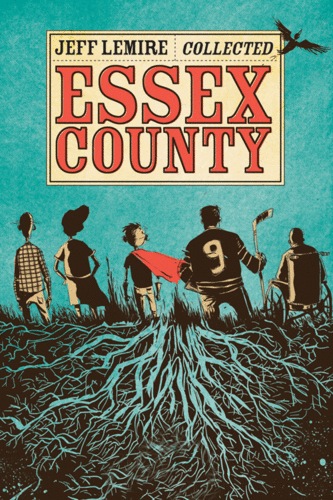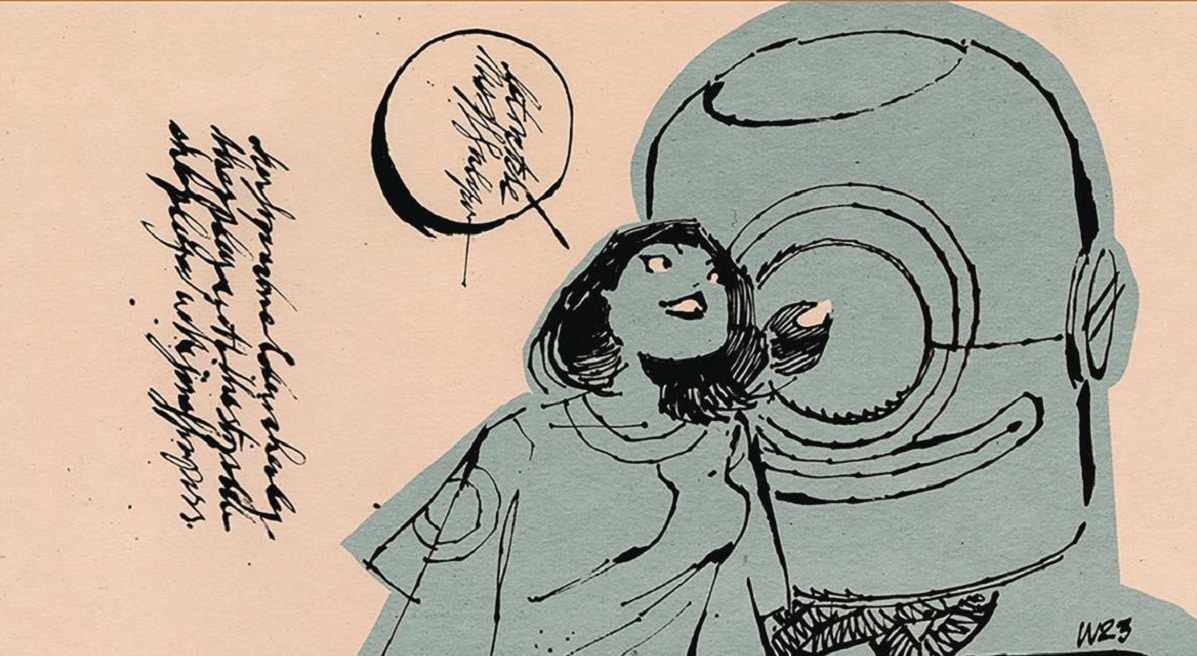When Jeff Lemire’s much-admired ESSEX TRILOGY made the Top Five of the Canada Reads competition to pick the best Canadian novel of the decade, it was a great boost for the cause of comics as literature. However, when it was voted off first in the final just BECAUSE it’s a graphic novel, some of the old notions of anti-comics prejudice raised their heads. Yan Basque has an excellent writeup of the whole affair:
Essex County was the first graphic novel to make it all the way to the five finalists that are debated on the air each year. While this was a significant milestone and it gave it an edge in the competition, it was also ultimately its downfall. Every interview or discussion or critique of the book started with broad comments about the form, and what it means for a graphic novel to be part of the competition, whether it can even be considered a novel, let alone one that can be compared in terms of value or merit or impact or significance to more traditional literature. As a result, there was hardly any discussion of Jeff Lemire’s work and what is unique about it, because so much attention was spent talking about the form. The book being part of the competition became less about this particular work of fiction by this specific artist with a unique voice in Canadian (and worldwide) literature, and more about the entire medium’s struggle to be taken seriously and accepted as art. In other words, the same tired old debate people have been having since the term “graphic novel” was invented. A debate that I’d like to think most of us who read comics are over.
The Canada Reads judges seemed to have prejudged ESSEX COUNTY, mostly as not representing the kind of literacy they wanted the contest to champion. For instance Ali Velshi — best known as that loud guy who used to be on CNN — said:
At this point he was interrupted, but he came back to that idea later and added: I am coming into this competition with the very committed idea (…) that I need this to end up as a competitiont that causes people to read more, and I’m not sure [Essex County] is that solution. (…) I don’t think that’s gonna solve our problems of low literacy levels. I don’t think that’s gonna solve our problem of creative and interpretive thinking.
Debbie Travis had the most old skool dismissal of comics as lit:
I think it’s a nice book. It really is a good book. But as the essential novel? It’s like saying tweeting with 140 character gets you writing. No, it doesn’t get you writing. It actually takes it in the other direction. So the danger of that book… I think this is a shortcut. I read this in an hour and a half.
Travis, incidentally, is not an author, educator or librarian — the usual guardians of culture — but a former model and interior designer manqué who hosts TV shows about home decor.
Basque points out that despite the judge’s skepticism, the people liked it: ESSEX COUNTY was voted #1 in the People’s Choice poll with more than 50 perent of the votes. Velshi, Travis, and the rest might want to rethink their positions on the future of literacy — it’s going to be a lot more varied than they will be comfortable with, for better or worse.








It’s called “transliteracy”.
“It’s like saying tweeting with 140 character gets you writing.”
Ahem:
Furu ike ya
kawazu tobikomu
mizu no oto
An old silent pond…
A frog jumps into the pond,
splash! Silence again.
My own wrap-up on the affair: http://joeshusterawards.com/2011/02/10/canada-reads-wrap-up-essex-county-wins-the-peoples-choice-final-thoughts/
The good thing that came out of this is exposure for Lemire’s Essex County and the graphic novel format in general. A lot of Canadians that would never have picked up the book before did because it was in the final five of this competition, and the surest way to erase existing prejudices is to show people what the medium is capable of.
I just don’t want us to drop the ball. We need to point those people exposed to graphic novels vis-a-vis Canada Reads towards other great graphic novels so as to fan the flames of interest in the medium and by extension, further acceptance of it.
I think a graphic novel is a different entity altogether from a novel; comics are comics, literature is literature, and each should be judged based on the abilities of their respective forms.
BUT…the Canada Reads folks shot themselves in the foot by allowing Essex County into the discussion in the first place, because it means that a) graphic novels are allowed for this particular award, and b) it was entirely possible that it could have won. To then change the conversation AFTER you let a comic in the front door to, “Well…should we really award a comic book?” is pretty slimy.
I was also pretty steamed at the tone of the discussion as it pertained to my favourite medium. I’ve written a blog post here – http://www.shatterdaycomics.com/home/2011/02/news-potpourri/ – if you’re interested.
I totally agree. Being in Canada I followed the whole debate, and was just appalled at some of the comments. I couldn’t quite believe the “celebrities” they decided to give the final decision to: An interior designer, a minor CBC sitcom supporting actor, an ex hockey player… what on Earth were they thinking?!
I was pleased as punch to see ESSEX COUNTY win the people’s choice poll though. That’s means much more that what these “celebrities” think!
Ali Velshi changed his tune by the end of the contest. The others, not so much. But yes, the panelists’ ignorance about the medium was on full display for the first two episodes.
Still, as Kevin says, the amount of publicity this has garnered for Essex County (which I’m proud to say I was talking up before just about anyone else was) and graphic novels in general is extremely, extremely positive. The public outrage toward the panelists’ comments about comics makes me think the battle is more won than lost.
Ali Velshi interviewed me about comics years ago for the old CNNfn, but it was all about comic books as investments. Sad to hear he doesn’t actually read them.
Same goes for Lorne Cardinal, whose acting work I greatly enjoyed. The irony is that his show CORNER GAS — one of the highest-rated Canadian sitcoms in broadcast history there — was replete with comic book references, and included an entire episode set in a comics shop.
zik, I completely disagree about comics not being literature. To me, that would be like saying that poetry is not literature, even though many classic works are written as poems. To me, literature is about telling a story, and while comics require a different method of dissection than a traditional novel, it should still be viewed as literature. To do anything less would be accepting the claims of the anti-comics people.
Sara Quin did her best. At least we had a decent person to champion our cause. Anyone heard if Jeff Lemire will still give her a page of art?
She tried.
Phil Uebbing,
It is not anti-film to say movies aren’t literature, or anti-music to say songs aren’t “audio-paintings.” I consider them to completely different mediums, and think it unwisely muddies the critical waters to judge a novel against a comic book, not because one is implicitly “better” than the other, but because they’re not comparable at all.
zik,
A few things, first, you are right about my generalization about saying that if someone says comics aren’t literature, then that doesn’t mean that they are anti-comic; people can be pro-comic while thinking they are not literature (like yourself, I assume).
However, when it comes to the umbrella term of Literature, comics do fall under that classification. Literature is defined as the art of written works, and literally translates to mean “acquaintance with letters.”
Comic books do consist of written material that still needs to be read, and not just simply “looked at.” So when it comes to a competition that is looking for Literature (or in this case “reads”), then we need to look at all mediums under this classification: novels, poems, essays, AND comic books or graphic novels. I agree that if the competition was looking for the best Canadian Novel, then considering a Graphic Novel would not work; seeing that it is a different medium. But, since this competition was looking for the best “read” (or work of literature) then it would be exclusive to consider only Novels; seeing as they are not the best, or the only, form of literature, or reading.
TL;DR?
Comic books are literature, because they still need to be read. Reading comics is still reading.
It’s sad. I’m working my way through Essex County at the moment, and while I haven’t read any of the other contestants I can think of more than enough grounds to argue for or against this book on the merits of its content but it doesn’t seem like any of the panelists got to that point. Though the more I look into this whole event, the more it comes off as something more akin to a game show than a real critical analysis of literature.
There’s a side of me who says ‘who needs ’em?’. The whole desire for ‘respectability’ is probably misguided – the same desire that leads people to call comics (yuck) ‘sequential art’. The more we are seen to be aiming for it, the more it will be denied. Whereas if we embrace the ‘outlaw’ status of comics among artforms, without apology or supplication, the pseuds will be far more likely to come around eventually, as they did with jazz, movies, etc. The only tangible advantage of respectability, I suppose, is that it means more library purchases of graphic novels, and perhaps more available grant money for those who want or need it. But except to the extent that money’s involved, I could care less whether the folks who fawn over Damien Hirst or the novelist-of-the-hour consider comics to be ‘art’ or ‘literature’.
That shouldn’t be underplayed.
Comics are literature. This is a fact. This is not a value judgement. Comics are literature, poetry is literature, film is literature, prose books are literature.
As usual, those who decry the form the most are the most clueless. Been that way since Wertham and his ilk from the ’40s. If Ali Velshi could get his cranium out of his anus, he would see millions of kids who learned their LOVE OF READING from comic books…and hence, graphic novels.
But that would require thinking for oneself and a mind that does not resemble a rusted-shut bear trap.
Ali Velshi is still on CNN. He never struck me as being a particularly bright fellow. A few IQ points above Rick Sanchez? Yeah, but that’s like saying the Titanic is wet.
While I’m very happy that Essex County (and hopefully by extension the entire medium) was given a boost in exposure, I’m hoping that the popular vote results aren’t due to a bunch of internetters taking up a cause and voting for it (having not read it or all the other books) to spite the panelists, because that is equally unhelpful.
The local CBC did a battle of the book clubs, where local book clubs discussed the 5 Canada Reads contenders.
None of the book clubs asked, would read Essex County, so I was asked to put a club together. Here’s an audio clip of the conversation.
http://www.cbc.ca/wam/episodes/2011/02/06/february-5-6-st-johns-book-club/
Though we all liked the book, only one of us thought it was “great”.
(Sigh) They should make up their minds. If comics count as literature by their standards, then they should allow them to be nominated – as Essex County was – and not penalize them. If they don’t think that comics count as literature, they shouldn’t be allowed in in the first place.
It isn’t like not calling music sound-paintings. It’s like allowing musicals into a Best Drama award, then refusing to consider a nominated movie because it is a musical.
As it is, it looks like they’re just allowing comics in in order to snub them. If you think a graphic novel shouldn’t win, why is it in the running at all?
“Reading comics is still reading.”
Good point, *and* it’s still not sharpening literacy as much as reading books that *don’t* come with pictures illustrating the words do.
Think about it: literacy is the skill of decoding words, and useful and necessary for a lot of parts of life instead of just for art appreciation and literature.
That’s why whether or not comic books are literature is actually besides the point when it comes to promoting reading to “solve our problems of low literacy levels.”
Low literacy is a problem primarily because of things that have nothing to do with art appreciation and literature.
For example, suppose you’re going to borrow money to buy a house. You need to *read* the mortgage papers before you decide whether or not to sign them. The worse you are at decoding those words – the less literate you are in the language in which the mortgage papers are written – the easier it is for you to end up with problems such as being charged more than you expect (since you weren’t literate enough to learn what to expect from the papers) and . Those papers *don’t* come with detailed pictures and speech bubbles pointing at who says what to help you understand the gist despite hard words and sentences with dependent clauses…
The people running the contest should have clarified this at the beginning and set eligibility standards ahead of time to focus the contest on texts that best sharpen the literacy skills.